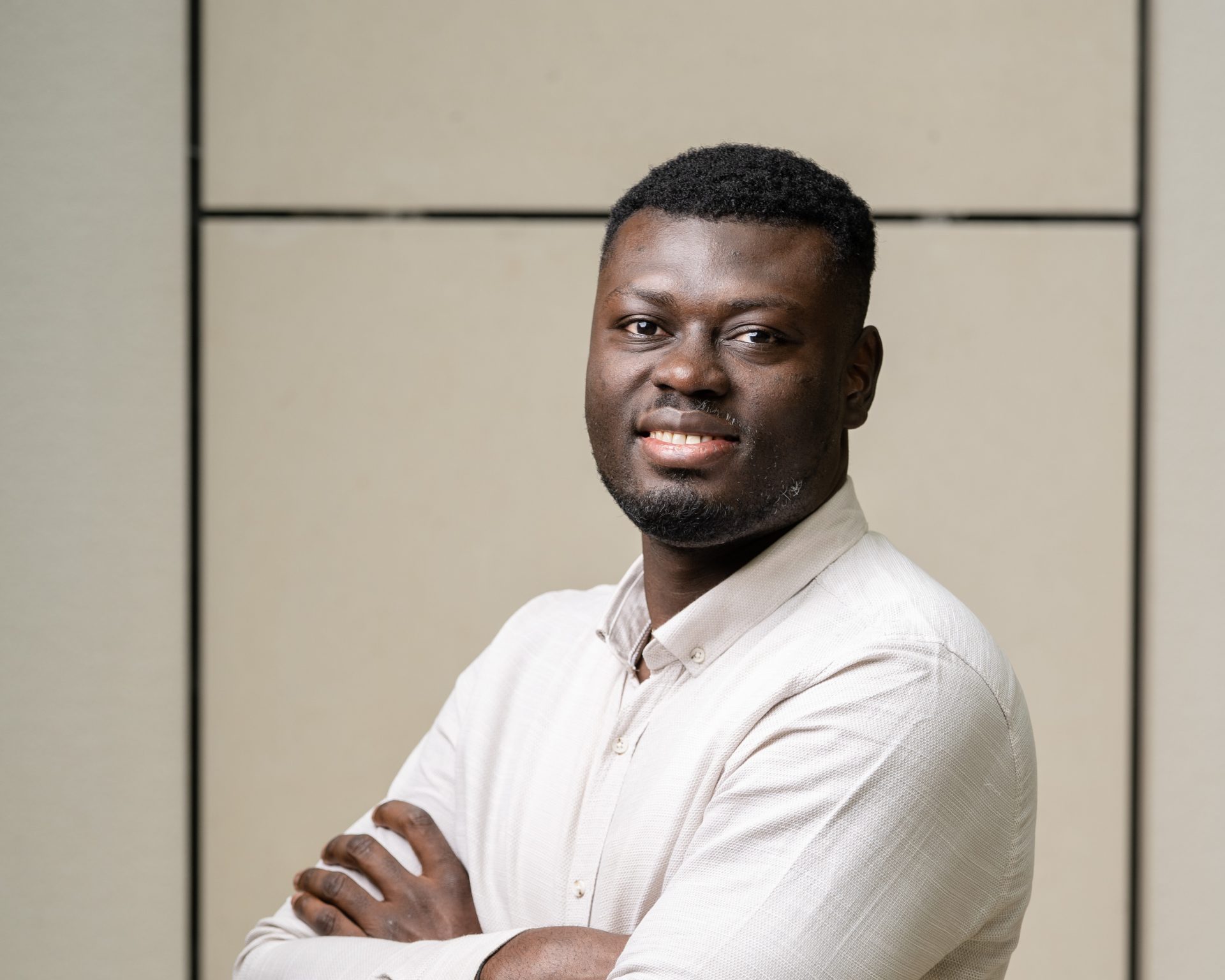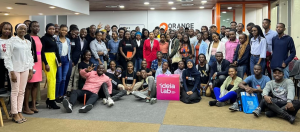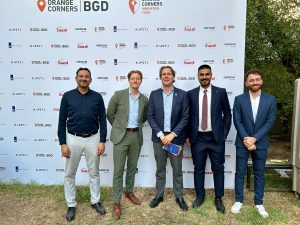Remember Derrick? This manufacturer of eco-friendly packaging was part of a group of young Ghanaian entrepreneurs who visited the Netherlands back in April. Back then we spoke extensively about the challenges of entrepreneurship in Ghana. As we ran into Derrick again at the West Africa Deal Summit, we took the opportunity to dive a little deeper into his world. A conversation about plastic pollution, women empowerment and the importance of education.
Welcome back, Derrick! Last time we spoke you were visiting the Netherlands. We already briefly touched on the topic of plastic pollution back then, but for those not familiar with DercolBags: can you explain what the problem is you see in society?
Plastic pollution is a global issue we’ve tried to deal with for years. There have been a lot of campaigns around it recently because it has truly created a mess. In Africa in particular, we’ve realised that a lot of the floods, property losses, and sometimes loss of lives, have been caused by plastic pollution. As more and more people rely on plastics for virtually all packaging, we generate a lot of waste that the government has to try and clean up. But they don’t have the funds for this. So as DercolBags, our goal is to replace single-use plastics polluting the environment with more eco-friendly alternatives.
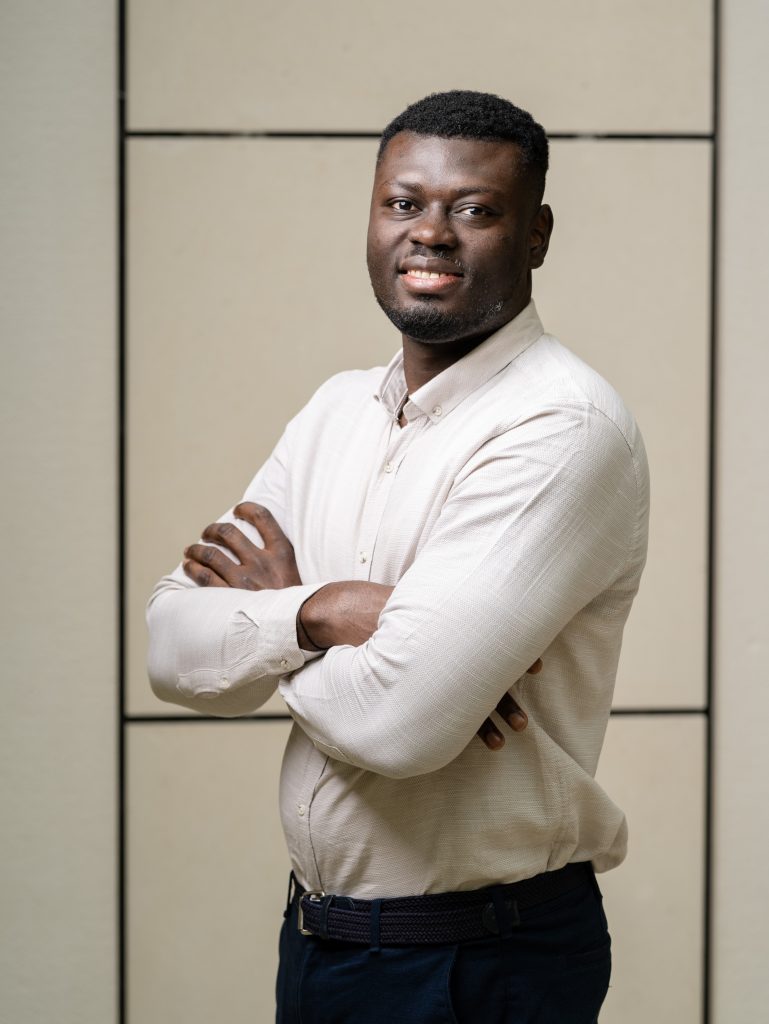
In Ghana, we don’t really segregate waste. Whether it’s biodegradable, plastic, paper or glass: everything goes in together. This makes it difficult to recycle, and waste collectors will just dump the waste on their dump sites. Research says about 5% is recycled. The rest ends up at dumpsites or in the gutters on our streets. When it rains, plastics in the drainage block the water from reaching the ocean. As a result, communities get flooded, and people lose their cars, properties, and sometimes even their lives. And it’s also causing illnesses like malaria. Today, when you look at our lagoons or oceans you see them polluted with plastics. This challenges the livelihood of the fisherfolk living in the coastal areas, as they’re losing income. Fishes see plastics as food and swallow them. So plastics become part of our human food chain as well.
Now when you look at the plastics packages value chain, you realise that these plastics are usually produced from fossil fuel (petroleum residue) into single-use plastics. Like plastic bags, cutleries or plastic bottles. These products are bought by wholesalers, who then sell them to businesses, especially in the retail sector. The restaurants, shopping centres, food vendors on our streets. When consumers buy food products from vendors, the packaging typically doesn’t last for more than 30 minutes before it’s disposed of.
When consumers buy food products, the packaging typically doesn’t last for more than 30 minutes before it’s disposed of
Derrick Kofi Sarfo, DercolBags
At Dercolbags, we offer a two-part solution: manufacturing alternative packaging products and changing the attitudes of the people. We educate our customers and the general public on the need to switch from single-use plastics to sustainable alternatives, and we also provide them with alternative packages made from regenerative or recycled material. For instance, when paper comes to the end of its life, it can be recycled into carton. So we encourage our customers and users to pick a more sustainable option instead of buying something that’ll pollute the environment. Our customers and users hardly throw away our products, but even when do, it’s still a better choice compared to plastics, because our products are biodegradable.
As an entrepreneur, you’re specifically focused on women. Why is that?
In Ghana, there are 2.1 million SMEs. The World Bank estimates that 44 per cent of MSMEs in Ghana are women-owned. This is similar across Sub-Saharan Africa: a large percentage of businesses are owned by women or led by women. And when you look at our value chain, from the manufacturing to the end user of plastic products, in between there’s often a retailer or a restaurant owner. These businesses are often run or owned by women entrepreneurs. If you look at our street vendors who sell snacks and lunch meals for example, most of them are women. If you’re visiting Makola market or any other major market in Ghana you easily realise that most of small businesses are owned and run by women. They own the majority of the informal sector. So the packaging they use matters.
Unfortunately, these women entrepreneurs often use single-use plastic packages, because it’s readily available and it’s cheap. Research says that restaurant businesses in Africa use about 70 million single-use plastics yearly. These women entrepreneurs have the power to change that. They can decide where to put their money. If you’re a customer and you buy something from them, you don’t get to decide the type of packaging you receive, they do. As a manufacturer of alternative packaging, we aim to empower these women entrepreneurs who possess such influence and purchasing power in our marketplace with the requisite knowledge about plastics and their impact on the environment and society and give them the tools and products to make a difference in their own spaces.
Women entrepreneurs own the majority of the informal sector. The packaging they use matters!
Derrick Kofi Sarfo, DercolBags
Education is a core business activity for DercolBags. How does this work beyond potential clients?
We educate in three phases. First, when we employ people. We take them through “why we do what we do”, so they understand the essence of sustainable packaging vs. plastic packaging. Secondly we engage with wholesalers and sales agents. These are the people who distribute our products. To get them on board, they need to understand why they should buy a product that’s slightly more expensive than single-use plastics. So they can educate the people who come to their shops to make more sustainable choices. And we also partner with NGOs and non-profits. Currently we work with a NGO from Ghana called Plastic Punch. They do advocacy on plastics. We go around schools, communities and talk to people about the effect of single-use plastics, how that affects livelihoods and health, and how people can switch and use alternatives. And we also use our social media platforms to educate people constantly on the need to switch to alternatives.
Plastic pollution is a problem that’s bigger than just Ghana. Do you see your approach as scalable and potentially exportable to other countries as well?
We see our company as part of the solution. One challenge is that single-use plastics are currently a lot cheaper than sustainable alternatives. Cost-wise, there’s a huge gap between plastic bags and fabric bags or paper bags. So as a business, what we’ve been working on is scaling our capacity, because the moment you start scaling your production capacity, you minimise costs. This creates room for the average entrepreneur to buy our products. The majority of the people in Ghana make decisions based on pricing. Therefore we’ve started with the minority that has a different mindset, and we gradually expand to the masses that’ll need cheaper products to be able to access our services. The OCIF subsidy is going to help us do that once our new machine gets in.
We’re really grateful to Orange Corners for putting this delegation together and helping us get access to a summit like this. This is the first time I’m pitching to investment firms. As we heard in the talks, local investors are looking for companies to invest in, and companies are looking for investments to grow their business. But somehow we never get to meet. This summit brings us together. My vision is to engage with investors and raise substantial investments, so we can scale a bit faster and reach a larger market.
Our goal is to expand beyond Ghana. One of our strategic goals is to be able to formally export by 2025. The same problem that we’re dealing with in Ghana is also happening in Nigeria, Benin, and Ivory Coast. So if we’re able to get some investments, build our capacity and grow enough, we can penetrate those markets.
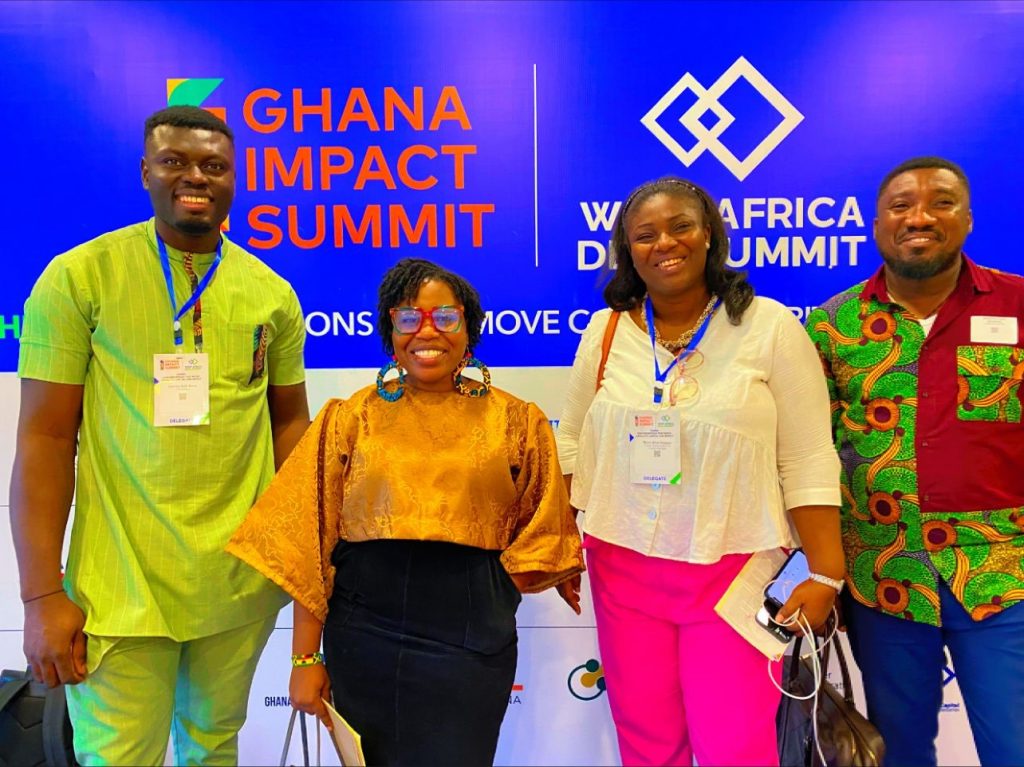
So that’s the short-term plan. What about the longer-term plan, say maybe in 5-10 years?
So in five years, we should’ve reached at least 5 West African countries – starting with Nigeria, then Benin, Togo, Ivory Coast and Liberia. We have agents in these countries already that often bring us deals, but we want to establish ourselves there very well and export larger volumes. In the next five years, we want to move our capacity up from about 1.5 million to 18 million units per annum, and gradually grow our revenue as well. To do that, we want to build a manufacturing plant here in Ghana big enough to meet both local as well as export demand.
And we also want to train 1,200 micro enterprises on sustainable packaging. We’ve realised over the years that micro enterprises can’t really afford our business. But if we train them on the need to switch from single-use plastics to more sustainable materials and teach them how to make their own sustainable packages with materials right in their own environment, they can support their business growth and even create more jobs. Therefore we teach them how to develop unique packages for their brands. And in doing that, they get to know what the SDGs are about, what sustainability is about and they’re able to incorporate these concepts into their business and train others in their community as well.
As an entrepreneur, I take risks every day. We need a system that encourages that.
Derrick Kofi Sarfo, DercolBags
As an entrepreneur, you clearly look beyond the boundaries of your own business. How do you see the future of entrepreneurship in Ghana?
As part of the first generation of entrepreneurs in Ghana that has benefitted from support programmes like as Orange Corners, I’m excited to have been invited to meet with investors. And there has always been direct foreign investment coming in. My hope and my prayer is that as Ghanaians and Africans we’ll start believing in ourselves. Because there are local investors in Ghana, people who have money who can invest in local entrepreneurs, but aren’t doing this.
I’ve been in business for close to eight years now and every single day I take risks. At first, it’s often about you trying to solve your problems, and finding ways to put food on your table. But when 5, 10 or now 18 people are working with you, your thinking changes. You start to think beyond yourself, and at this point quitting equates to selfishness. In this part of the world employees have about 4-5 people depending on them. Parents, siblings, and children. It’s tough to just think solely about yourself.
It’s time for Ghanaian institutions, banks, investors and people with money to take a leap of faith and invest in the future of this country. That’s the only way we can grow Africa!
Derrick Kofi Sarfo, DercolBags
So the real question is: how do we grow so we can sustain the momentum and the people we work with? Failing would mean a big blow for my employees. So if entrepreneurs take such risks, we need a system that encourages that. I’ve seen a lot of brilliant entrepreneurs give up over the years because entrepreneurship is tough, it’s too hard. We’re grateful to international partners like Orange Corners, but it’s about time for Ghanaian institutions, banks, investors and people with money to take a leap of faith and invest in the future of this country. That’s the only way we can grow Africa. So I would end by like saying: believe in us entrepreneurs and invest in us!
Follow Derrick’s DercolBags online:
Website
Facebook
Instagram
X
LinkedIn

